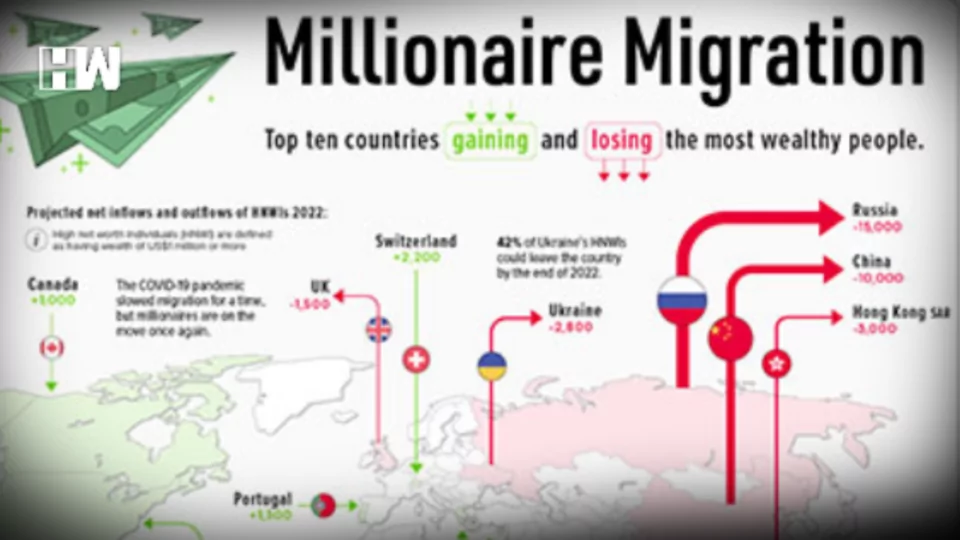The Covid-19 pandemic had slowed down migration for the time being, but high-net-worth individuals are on the move again
New Delhi: The Covid-19 pandemic had slowed down migration for the time being, but high-net-worth individuals are on the move again.
High-net-worth individuals are defined as having wealth of USD 1 million or more. So far in 2022, Russia, China, and India are the top three countries which lost the highest number of millionaires.
These countries lost 15,000, 10,000, and 8,000 individuals, respectively, according to a report by global consultant Henley and Partners.
On India, the report said these outflows are not particularly concerning as India produces far more new millionaires than it loses to migration.
“There is also a trend of affluent individuals returning to India and once the standard of living in the country improves, we expect wealthy people to move back in increasing numbers,” it said.
It expects India’s high-net-worth individual population to rise by 80 per cent by 2031, which will make it one of the world’s fastest-growing wealth markets during this period.
For China, the banning of Huawei 5G by several major markets such as Australia, the UK, and the USA was a big setback for the country.
“Huawei was the crown jewel of China’s hi-tech sector and may well have emerged as the world’s biggest tech company if not for the global interference. China’s deteriorating relationships with Australia and the USA are also a major long-term concern,” it said.
Hong Kong SAR, Ukraine, Brazil, Mexico, the UK , Saudi Arabia, and Indonesia are some of the other countries which saw a net outflow of millionaires in 2022, the report showed.
High-net-worth-individual migration figures are an excellent barometer for the health of an economy. Affluent individuals are extremely mobile, and their movements can provide an early warning signal about future country trends.
Countries that draw affluent individuals and families to migrate to their shores tend to be robust, with low crime rates, competitive tax rates, and attractive business opportunities.
Millionaire migration has been a rising trend over the past decade, but understandably dipped in 2020 owing to the Covid-19 pandemic, and no country-specific figures are available for 2020 and 2021 as the coronavirus outbreak made it difficult to track movement owing to lockdowns and travel restrictions.
By the end of 2022, 42 per cent of Ukraine’s high-net-worth individuals are expected to leave the country. This may be largely due to the invasion by Russia.
In this period of 2022, UAE, Israel, the US, Portugal, Canada, Singapore, Australia, New Zealand, Greece, and Switzerland, on the flip side, saw the most inflow of millionaires.
Notably, nearly 80,000 millionaires have moved to Australia over the past two decades. In 2022, 3,500 individuals landed in the country.
Moreover, the report said large numbers of millionaires are also expected to move to ‘the three Ms’: Malta, Mauritius, and Monaco.
Also Read: UAE To Host Afghanistan’s Home Fixtures For Next 5 Years
“The UAE is expected to attract the largest net inflow of high-net-worth individuals in 2022. Approximately 4,000 millionaires are expected to move to the country this year — one of the UAE’s largest inflows on record.
Most hail from Russia, India, Africa, and the Middle East. Before the pandemic the UAE traditionally attracted around 1,000 millionaires per year,” the report said.
Singapore continues to attract millionaires, mainly from the rest of Asia. A net inflow of approximately 2,800 high-net-worth individuals is expected in the city-state in 2022.
Notably, Singapore is emerging as Asia’s top wealth management centre, which should assist in attracting many more affluent individuals to relocate there in future.
(Except for the headline, this story has not been edited by HW News staff and is published from a syndicated feed.)
As an independent media platform, we do not take advertisements from governments and corporate houses. It is you, our readers, who have supported us on our journey to do honest and unbiased journalism. Please contribute, so that we can continue to do the same in future.

